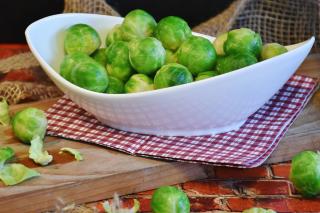

Its rough, bitter taste sends the weak-spirited away… since the 17th century! Nonetheless, Brussels sprouts are an excellent source of vitamin C and fiber, especially during the winter season.
As its name so claims, Brussels sprouts originated in the capital city of Belgium. In the 17th century, this prominent city grew exponentially due to the industrial revolution. In the suburbs, local farmers of Saint Gilles were having trouble finding space for their crops. They bred a variety of headed cabbage that nestled its heads just under the leaf stalks. Just like its close cousins, cauliflower or broccoli, Brussels sprouts stemmed from a wild species native to the Mediterranean area. Since it grows vertically, it has the great advantage of requiring less land area.

They are harvested in fall or at the beginning of winter. On market days, wiser market-goers know to choose pieces that are all the same size, so that they will cook to perfection all at the same time.
Tender young pieces usually taste sweetest.
Since they’re 90% water, and rather small, these vegetables are quite fragile. It is best to eat them quickly, before they dry up and wilt.
20 oz (600 g) Brussels sprouts
- 28 oz (800 g) ground veal,
- a bouquet of tarragon
- 2 plain yogurts
- salt and ground pepper
Peel the Brussels sprouts and cook them 20 minutes in salted water. Drip dry and rinse them in cold water. Rinse and chop the tarragon. Set aside two table spoons of tarragon. Mix remaining tarragon into the ground veal. Add salt and pepper. Prepare meatballs the size of a walnut.
In a frying pan, heat two tablespoons of olive oil. Fry the meatballs for 3 to 4 minutes in the hot pan, until colored, and pull them out of the pan. Add the yogurt and the tarragon that was set aside to the oil in the pan, stir. Add salt and pepper. Present the meatballs on the serving dish, doused in the yoghurt sauce with Brussels sprouts on the side.
M.B.